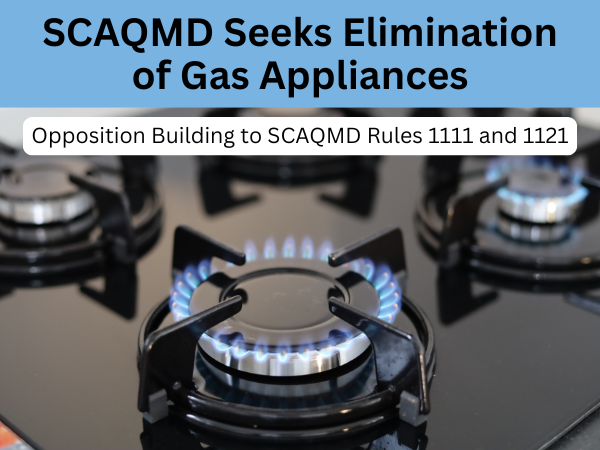SCAQMD Seeks Elimination of Gas Appliances – Opposition Building to SCAQMD Rules 1111 and 1121
More than 70 organizations highlight lack of public education and punitive $300M/year cost for all-electric furnaces and heaters as reasons to oppose Amended Rules 1111 and 1121.
Citing a lack of widespread public knowledge about two rules that would directly impact millions of homeowners, renters, schools, and small businesses in Los Angeles, Orange, Riverside, and San Bernardino counties, the Cost-of-Living Council announced that a broad-based coalition of more than 70 organizations has united in opposition to Rules 1111 and 1121.
These two rules, unless defeated, would:
-
Compel consumers to convert existing natural gas-powered furnaces (Rule 1111) and water heaters (Rule 1121) to all-electric models
-
Or pay fees totaling $300 million annually just to continue using natural gas appliances
Broad-Based Opposition Growing
“We’ve found widespread opposition from social justice, ethnic, business, community groups, affordable housing advocates, and local governments once they learn about these two rules that directly target consumers,”
— Matt Klink, spokesperson for the Cost-of-Living Council
“Many of these groups had no prior knowledge that the SCAQMD was pursuing these rules, but once they became aware, they joined our coalition and/or voiced strong opposition to these expensive mandates.”
Concerns About Transparency and Equity
“It’s concerning that we had to learn about these impactful regulations affecting homeowners and renters through the Cost-of-Living Council rather than directly from the SCAQMD,”
— Brenda J. Rodriguez, Executive Director of Affordable Housing Clearinghouse
Rodriguez emphasized the need for:
-
Transparency and community engagement
-
Awareness that these rules could disproportionately impact communities of color and low-income families
-
Acknowledgment that many families continue to struggle with Southern California’s high cost of living
Hidden Costs and Consequences
SCAQMD staff significantly underestimated or overlooked the costs of converting new and existing appliances to electric. Key concerns include:
-
Costly upgrades to electrical panels, especially in older buildings
-
Increased rents as landlords pass costs on to tenants
-
Added strain on an already vulnerable power grid
-
Higher electric bills for consumers
“SCAQMD staff has not calculated the real out-of-pocket costs required to comply with this rule, nor have they taken current and planned electricity costs into account.”
— Darrel Sauceda, Chairman, Los Angeles Latino Chamber of Commerce
“The cost of these rules to consumers greatly exceeds the alleged air quality benefits of these mandates.”
Reliability Issues with Electric Heat Pumps
In the April 1, 2025 issue of Consumer Reports, a concerning finding was reported:
“In our latest analysis, we found that 30 percent of heat pumps broke or stopped working by the end of the eighth year of ownership, essentially halfway through their expected lifespan. That makes them one of the least reliable products we have ratings for.”
Cost-of-Living Study Highlights Consumer Burden
In February 2025, the Cost-of-Living Council released a comprehensive economic impact report on the draft amended Rules 1111 and 1121:
-
Conducted by a veteran economic analyst with 40 years of experience in California environmental policy
-
Found the proposed rules would cost consumers $7.7 billion over a 25-year lifecycle
👉 Download the study and executive summary here
Final Word: A Threat to Affordability
“It’s one thing to talk about the importance of affordability, but it’s something entirely different if you’re talking about raising costs on millions of Californians through bureaucratic procedure,”
— Steven Figueroa, President, Inland Empire Latino Coalition
Figueroa highlighted the combined impact of:
-
Higher appliance costs
-
Higher electricity costs
-
Panel upgrades
-
New natural gas appliance fees
Rules 1111 and 1121 will decrease housing affordability and make life even more expensive in Southern California. These proposed rules need to be defeated.

